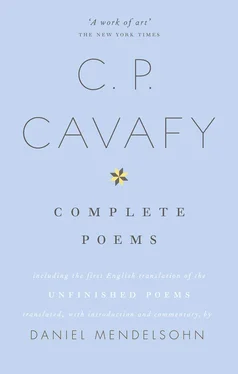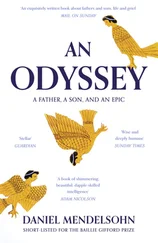there’s one thing that still he contemplates
with lofty pride: that even in defeat
he shows the same indomitable valor to the world.
The rest—was dreams and vain futility.
This Syria—it barely even resembles his homeland;
it is the land of Heracleides and of Balas.
[ 1915 ; 1919]
“Where has he gone off to, where did the Sage disappear?
Following his many miracles,
and the great renown of his instruction
which was diffused among so many peoples,
he suddenly went missing and no one has learned
with any certainty what has happened
(nor has anyone ever seen his tomb).
Some have put it about that he died in Ephesus.
But Damis didn’t write that. Damis never
wrote about the death of Apollonius.
Others said that he went missing on Lindos.
Or perhaps that other story is
true, that his assumption took place on Crete,
in the ancient shrine of Dictynna.—
But nonetheless we have the miraculous,
the supernatural apparition of him
to a young student in Tyana.—
Perhaps the time hasn’t come for him to return,
for him to appear before the world again;
or metamorphosed, perhaps, he goes among us
unrecognized.—But he’ll appear again
as he was, teaching the Right Way. And surely then
he’ll reinstate the worship of our gods,
and our exquisite Hellenic ceremonies.”
So he daydreamed in his threadbare lodging—
after a reading of Philostratus’s
“Life of Apollonius of Tyana”—
one of the few pagans, the very few
who had stayed. Otherwise—an insignificant
and timid man—he, too, outwardly
played the Christian and would go to church.
It was the period during which there reigned,
with the greatest piety, the old man Justin,
and Alexandria, a god-fearing city,
showed its abhorrence of those poor idolators.
[ 1897 ; 1910 ; 1920 ; 1920]
Young Men of Sidon (400 A.D.)
The actor whom they’d brought to entertain them
declaimed, as well, a few choice epigrams.
The salon opened onto the garden;
and had a delicate fragrance of blooms
that was mingled together with the perfumes
of the five sweetly scented Sidonian youths.
Meleager, and Crinagoras, and Rhianus were read.
But when the actor had declaimed
“Here lies Euphorion’s son, Aeschylus, an Athenian—”
(stressing, perhaps, more than was necessary
the “valour far-renowned,” the “Marathonian lea”),
at once a spirited boy sprang up,
mad for literature, and cried out:
“Oh, I don’t like that quatrain, not at all.
Expressions like that somehow seem like cowardice.
Give—so I proclaim—all your strength to your work,
all your care, and remember your work once more
in times of trial, or when your hour finally comes.
That’s what I expect from you, and what I demand.
And don’t dismiss completely from your mind
the brilliant Discourse of Tragedy—
that Agamemnon, that marvelous Prometheus,
those representations of Orestes and Cassandra,
that Seven Against Thebes —and leave, as your memorial,
only that you, among the ranks of soldiers, the masses—
that you too battled Datis and Artaphernes.”
[ 1920 ; 1920]
One candle is enough. Its faint light
is more fitting, will be more winsome
when come Love’s— when its Shadows come.
One candle is enough. Tonight the room
can’t have too much light. In reverie complete,
and in suggestion’s power, and with that little light—
in that reverie: thus will I dream a vision
that there come Love’s— that its Shadows come.
[ ? ; 1920]
The poet Phernazes is working on
the crucial portion of his epic poem:
the part about how the kingdom of the Persians
was seized by Darius, son of Hystaspes. (Our
glorious king is descended from him:
Mithridates, Dionysus and Eupator.) But here
one needs philosophy; one must explicate
the feelings that Darius must have had:
arrogance and intoxication, perhaps; but no—more
like an awareness of the vanity of grandeur.
Profoundly, the poet ponders the matter.
But he’s interrupted by his servant, who comes
running and delivers the momentous intelligence:
The war with the Romans has begun.
Most of our army has crossed the border.
The poet stays, dumbfounded. What a disaster!
How, now, can our glorious king,
Mithradates, Dionysus and Eupator,
be bothered to pay attention to Greek poems?
In the middle of a war—imagine, Greek poems.
Phernazes frets. What bad luck is his!
Just when he was sure, with his “Darius,”
to make his name, and to reduce his critics,
those envious men, to silence at long last.
What a setback, what a setback for his plans!
And if it had only been a setback: fine.
But let’s see if we are really all that safe
in Amisus. It’s not a spectacularly well-fortified land.
The Romans are most fearsome enemies.
Is there any way we can get the best of them,
we Cappadocians? Could it ever happen?
Can we measure up to the legions now?
Great gods, protectors of Asia, help us.—
And yet in the midst of all his upset, and the disaster,
a poetic notion stubbornly comes and goes—
far more convincing, surely, are arrogance and intoxication;
arrogance and intoxication are what Darius would have felt.
[< 1897? ; 1917 ; 1920]
She laments in the prologue to her Alexiad,
Anna Comnena laments her widowhood.
Her soul is in muzzy whirl. “And with
freshets of tears,” she tells us, “I deluge
mine eyes. … Alack the breakers” of her life,
“alack for the upheavals.” Anguish burns her
“unto the very bones and marrow and rending of my soul.”
Nonetheless the truth seems to be that she knew one
mortal grief alone, that power-loving woman:
that she had only one profound regret
(even if she won’t acknowledge it), that supercilious Greekling:
for all of her dexterity she didn’t manage
to secure the Throne; instead he took it
practically right out of her hands, that upstart John.
[ 1917 ; 1920]
Byzantine Noble, in Exile, Versifying
Let the dilettantes call me dilettante.
In serious matters I have always been
most diligent. And on this I will insist:
that no one has a better knowledge of
Church Fathers or Scripture, or the Synodical Canons.
On every question that he had, Botaniates—
every difficult ecclesiastical matter—
would take counsel with me, me first of all.
But since I’ve been exiled here (curse that spiteful
Irene Ducas) and am frightfully bored,
it’s not at all unseemly if I divert myself
by crafting verses of six or seven lines—
divert myself with mythological tales
of Hermes, and Apollo, and Dionysus,
or the heroes of Thessaly and the Peloponnese;
or with composing strict iambic lines
such as—if I do say so—the litterateurs
of Constantinople don’t know how to write.
That strictness, most likely, is the reason for their censure.
[ 1921 ; 1920]
Читать дальше












